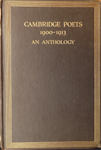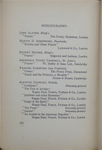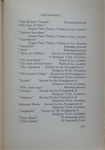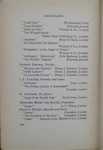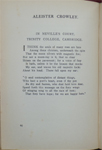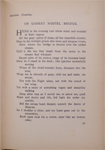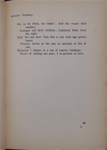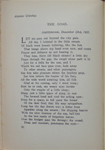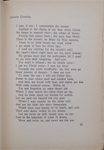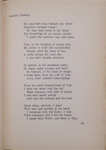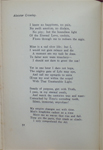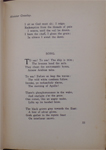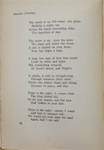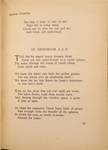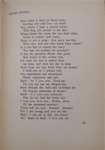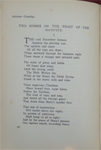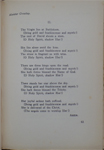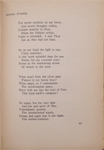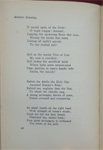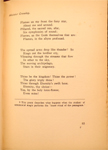100th
MP

|
THE
100th
MONKEY
PRESS |
|
|
|
Limited Editions by Aleister Crowley & Victor B. Neuburg |
|
Bibliographies |
|
Download Texts
»
Aleister
Crowley
WANTED !!NEW!!
|
|
CAMBRIDGE POETS 1900 - 1913 |
|
Image Thumbnails |
||||
|
Title: |
Cambridge Poets 1900-1913: An Anthology. |
|
||
|
Variations: |
|
|||
|
Publisher: |
W. Heffer & Sons, Ltd.1 |
|||
|
Printer: |
|
|||
|
Published At: |
Cambridge, England.1 |
|||
|
Date: |
1913.1 |
|||
|
Edition: |
1st Edition. |
|||
|
Pages: |
xviii + 226. |
|||
|
Price: |
|
|||
|
Remarks: |
Compiled by Aelfrida Tillyard.1 This book contains the following ten poetic works by Crowley: “In Neville's Court” on page 46, “On Garrett Hostel Bridge” on page 47, “The Goad” on page 50, “The Rosicrucian” on page 52, “Song” on page 55, “In Memoriam A.J.B.” on page 57, “The Challenge” on page 58, “Two Hymns on The Feast of the Nativity” on page 60, “The Palace of the World” on page 62, and “Perdurabo” on page 66.1 Also contains a short bibliography of Crowley's works on pages 222-224.1 Title page is printed in red and black.1 |
|||
|
Pagination: |
|
|||
|
Contents: |
(Crowley's Contributions) - In Neville's Court - On Garrett Hostel Bridge - The Goad - The Rosicrucian - Song - In Memoriam A.J.B. - The Challenge - Two Hymns on The Feast of the Nativity - The Palace of the World - Perdurabo |
|||
|
Author’s Working Versions: |
|
|||
|
Other Known Editions: |
||||
|
Bibliographic Sources: |
|
|||
|
Comments by Aleister Crowley: |
|
|||
|
Reviews: |
Far the worst lack in discretion of compilation is the devotion of 20 pages to Mr. Aleister Crowley, whose over-blown rhetoric is so well-known that it surely might have been omitted altogether. —The Manchester Guardian, date unknown. ______________________________
From Mr. Aleister Crowley’s strange and mystical books
the editor has selected some 20 pages of poetry which we have
contemplated with considerable astonishment, but little
admiration, although we recognise a Promethean grandeur which
elsewhere we seek vanity. ______________________________
Oxford Poetry, 1910-1913. Edited by G.D.H.C., G.P.D., and W.S.V. Introduction by Gilbert Murray. (Blackwell, 3s. 6d. net. Cambridge Poets, 1900-1913. Chosen by Aelfrida Tillyard. Introduction by A. T. Quiller-Couch. (Heffer. 5s. net) “The poetry is produced in spite of all.” So says Professor Gilbert Murray, who knows something of both universities. And I think that similar collections of Manchester, or Newcastle, or Cardiff, or Birmingham poetry, by men of under twenty-five, would not very greatly differ from Oxford Poetry, or at all excel it. Cambridge Poets includes the work of women, of men who took their degrees twelve years ago or more, and men who are still undergraduates. It may be said of both sets, what Professor Murray says of the Oxford set, that they are “at one point or another, in touch with almost all the moving impulses of contemporary poetry,” while some of the Cambridge poets, such as Messrs. Aleister Crowley and Rupert Brooke, are already among those impulses, and still more, such as Mrs. Cornford, “John Presland,” Sarojini Naidu, and Messrs. Flecker, H. O. Meredith, Harold Munro., and J. C. Squire are among the marked personalities of the day. . . .
[ . . . ] —Poetry and Drama, December 1913. ______________________________
Cambridge Poets, 1900-1913. Chosen by Aelfrida Tillyard. (Pp. 215. 5s. net. Cambridge: W. Heffer & Sons.) Criticism of this volume is disarmed by the modest claim which Sir A. Quiller-Couch puts forward in his introduction. It would seem that the public are asked to accept its contents, not as offering any achievement of permanent value, but as affording evidence of a body of poetic sensibility and technical skill out of which some one worthy of the name of poet may eventually arise. Taken on this level, the selection may be welcomed, though it cannot be said that many of the thirty-eight writers whose names appear are either well known already to the reading public or are likely to become so. Most of the contributions must be definitely classed under the heading of minor poetry, such as demands no very warm encouragement in the interests of literary art. The writing of verses is an agreeable pastime which is well fitted to develop the artistic appreciation of those who practise it; but we do well not to make the approach to Parnassus too easy. Of the writers represented here, perhaps the most promise is shown by Rupert Brooke and James Elroy Flecker, but praise is due also to the work of John Alford, Frances Darwin Cornford, Aleister Crowley, Dermot Freyer, and Victor B. Neuburg. —The Educational Times, 2 February 1914. ______________________________
Almost simultaneously have appeared an anthology of Cambridge Poets (1900-1913) published by Heffer, and another of Oxford Poets (1910-1918) published by Blackwell. Sir A. Quiller-Couch introduces the former, and Professor Gilbert Murray the latter. There is much more performance and much more promise in the Cambridge volume than in the Oxford one. The Oxford book suffers, no doubt, from the restriction of date, though unless “1910-1918” implies (which I doubt) that all the writers included have been undergraduates at some time during that period, it might have been improved by selections from recent volumes by young Oxford men still in their twenties, whose works have not been drawn upon. As it is, there is not really a striking serious poem in the collection. The best things are some of the parodies at the end, especially Mr. R. A. Knox’s most ingenious Absolute and Abitophell, Mr. Philip Gucdalla’s Dolarcs, and Mr. Bridges-Adams’ chaste Fragment from the Elizabethan. Mr. Michael Sadler’s Sic Transit and Mr. R. A. Eric Shepherd’s Parvula Dorothea are graceful; but the majority of the other poems are affected and unconvincing. The most prevalent influence appears to be that of Mr. Belloc, but the mark of Mr. Mascfield is visible on these lines by Mr. A. J. Dawe:
And all that night I roared and cried, And kissed the woman by my side, And she was very kind to me And understood my misery. And I was full of beer and gin And deadly drunk, and all for sin To quench the raging flame within. And all the people in the fair Could only stop and stare and stare Till I could bash their faces in. . . . . The blood went singing in my ears And in my eyes ran burning tears, And being out for mighty fun I did great things I’d never done. . . . . And now I feel my smashed-up soul Is clinkered like a burned-out coal.
This is not ostensibly parody. The Cambridge book contains work by nearly forty writers, including M. D. Armstrong, Rupert Brooke, A. Y. Campbell, Frances Cornford, Aleister Crowley, J. E. Flecker, Harold Monro, and Sarojini Naidu. There are some good poems, and there might have been more had several of these poets been represented by their best work. Mr. Brookse’s Dining-Room Tea might well have accompanied his Grantchester, and better examples might have been given of Mr. Armstrong and Mr. Flecker. Mr. Campbell, whose small book published last year contained some remarkably good work, ought to have had much more space, and one could have spared the contributions of several uninspired writers who occupy about a dozen pages each. But the editress (Aelfrida Tillyard) has helped to demonstrate that there is a genuine revival in poetry, and if the quality of her anthology has suffered by the inclusion of so large a number of writers, that is presumably accounted for by a conscientious desire to cover the ground properly. SOLOMON EAGLE. —The New Statesman, 29 November 1913. ______________________________
Oxford and Cambridge, said somebody, do nothing together, but they do the same things at the same time. Some squint of Providence’s judicious eyes, or perhaps a furtive colloquy between Mr Heffer and Mr Blackwell, say at Bletchley Junction, has led to the simultaneous appearance of these two books:—‘Cambridge Poets, 1900-1913, an Anthology chosen by Aelfrida Tillyard,’ and ‘Oxford Poetry, 1910-1913,’ edited by a triumvirate of consonants. Whatever Providence and publishers may know about it, the two prefaces are blissfully or willfully ignorant of each other. The very titles are prettily diverse. ‘Oxford Poetry,’ ‘Cambridge Poets’: what is this but the old antithesis of ‘movements and men?—Cambridge individualistic as ever, Oxford
so careful of the type, So careless of the single life
(though, as for type, the Cambridge book is the pleasanter to the eye). However, the Oxford preface assures us that the book ‘is in no sense the work of a “school” of poets,’ and that Oxford for the nonce ‘is not creating a new movement.’ Again, ‘Cambridge Poets, an Anthology’: there is no mistaking that; but the triumvirs tell us that their anthology is, ‘strictly speaking, not an anthology at all’—but just pot-luck, so to speak. Then, ‘1900-1913’ against ‘1910-1913’: subtract, and compare.
Better fifty years of Europe than a cycle of Cathay.
So far, we have just been throwing out a few hints, with all respect, to our London contemporaries, who will want to make these two books the ground of a University match. The rule for anthologies is to read first the poems that you know, then those that are not there, thirdly the preface, and lastly, if time allows, the rest. This week time does not allow, so we suspend judgment. Meanwhile, here are prefaces by Professor Gilbert Murray and Sir Arthur Quiller-Couch; here is Mr Rupert Brooks on Granchester; here is Mr R. A. Knox’s ‘Absolute and Abitohell, a Satire in the Manner of Mr John Dryden upon a newly-issu’d Work entitl’d Foundations.’ Mr Knox has returned to this charge in a prose-work called ‘Some Loose Stones’—or is it ‘Tiles’?—which we have not yet read; but the present poem bids fair to be the best thing in either of our two collections. Incidentally it furnishes a motto for future Cambridge anthologies:
But we, for ev’ry one of theirs, have two, And trust the Watchfulness of blessed Q.
As to poems that are not there, we can only speak for Cambridge. Is our Minerva unacquainted with ‘Euphrosyne,’ born in 1905? Does she not subscribe to ourselves? If she does, where are certain poems on Mike and Barts and CATS, or the jolly ‘Song of the Lecture Room’ by R.F.D., published by us in May of 1909? . . . . . We have noticed a few surface-blemishes. ‘Euripedes,’ in a poem by a Johnian mathematician, is doubtless a studied negligence: but why is our Magdalene oxonically curtailed? Has this something to do with Mr Neuburg’s poem ‘Under Magdalen Bridge,’ whence he espies meadows damp and trim? For surely these meadows belong to Another Place. Again, one sees why Mr Aleister Crowley should have forgotten how to spell the Nevile’s Court of his old College; but he ought to be more at home on ‘Garret Hostel Bridge.’ And why has Mr G. H. S. Pinsent been annexed by King’s? But enough, for the present. By next week we may even have to read the books. —The Cambridge Magazine, 20 November 1913. ______________________________
After reading first the anthology and then the preface contributed by Sir Arthur Quiller-Couch, we discovered we had taken an unnecessary precaution. His discursive essay advisedly makes no attempt at detailed praise, and no attempt to indicate any particular and essential tendencies of the poets represented. The anthology contains some poems already well known, notably "The Old Vicarage, Grantchester," by Mr. Rupert Brooke, which was certainly amongst the half-dozen best poems of 1912. Familiar, too, are "The Golden Journey to Samarkand," in the austere style of Mr. Elroy Flecker, and "The Railway Station," by Mr. J. Collings Squire, whose wonderful parodies unfortunately are excluded from the scheme of the volume. From Mr. Aleister Crowley's seven-and-thirty strange and mystical books the editor has selected some twenty pages of poetry which we have contemplated with considerable astonishment, but little admiration, although we recognize in the sonnet "Perdurabo" a Promethean grandeur which elsewhere we seek vainly. Mr. Harold Munro, a courageous writer whom we admire further as a publicist in the cause of poetry, contributes a dramatic poem "God." The asterisks placed against pieces unpublished elsewhere mark a considerable number of school-exercises such as the "Fragmentary Views: of Mr. Francis Bekissy, and at least one fascinating poem, "Mary Ford and Jimmy Price," a ghost story, something after the tritely-rhymed manner of Mr. Masefield, but with certain claims to originality. Perhaps the editor's twelve-page selection from her own undistinguished poetry accounts for some errors in choice, and yet, reading carefully through the anthology, we cannot fail to be comforted by many excellent lyrics from writers well known and unknown. Happily the laborious pseudo-classic productions of an earlier generation are absent, and much of the verse—at lowest the manifestation of the enduring impulse to poetry—is original and underivative. It would be unjust to condemn even the bulk of the volume as 'prentice-work, for with poets such as those first names, and Mr. H. O. Meredith, directly in touch with life itself, and sensitive to its appeal, there is more durable merit than the outward graces of mere literary craftsmanship. —The Birmingham Daily Post, 30 January 1914. ______________________________
It would be accepting too much to accept this volume as typical of Cambridge. To begin with, the compiler is a lady and one who might be accused with every appearance of reason of having rather too great personal interest in a book which contains no fewer than eleven of her hitherto unpublished poems, as against less than eleven for all the other thirty-seven authors. We begin, then, with expectation of partiality, and it is, at any rate, to be hoped that this collection need be taken as no more than the expression of “Aefrida Tillyard’s” likes. Secondly, Sir Arthur Quiller-Couch is not typical of Cambridge but leagues from being so; and this is a refreshing reflection, for his Introduction is discreditable. The present writer, reading carelessly, supposed through five pages that the lady-compiler was writing. It should not have been a shock, but it was one, to discover the truth. We put it to any reader whether the feminine pen following has not all the character of a precieuse. “I shall take it to be conceded at this time of day, not only that good poetry is worth writing, but that our language has a capacity and our nation a rather special aptitude for it; and these admissions—if the reader will be good enough to make them before starting upon the poems here collected—will excuse together the authors, the anthologist, and the contributor of this short ‘Introduction.’ “ Why “at this time of day?” Shakespeare has been dead a long while and Chaucer longer still. When, and by whom, was “good” poetry ever considered not worth writing? “Q.” is certainly thinking of his “Daily Mail.” And this “rather special” aptitude—what a coy little way of getting the nation to think well of itself, if the reader will only be good enough to admit first that fine poetry may be worth writing, and to excuse our troubling him with our anthology! Windy silliness is all there is to that, and it is no excuse for a writer “at this time of day” when all is “conceded” of whatever there may have been unconceded” by the ignorant public—it is no avail to a Professor of English Literature that one or two wounded poets have titled at the bourgeoisie of their times. But Sir Arthur Quiller-Couch will make you five pages of colloquialism and archaism over this conceded point and drag in the naked evidences of his studies, a dozen or so of famous names. “It takes (I say,” he says, “a great and brave man to perceive this [the permanence of poetry].” Our Professor is, then, a great and brave man, for he perceives. We get a little feminine description of his exact surroundings at the instant of writing, which description serves to introduce an image of waves that owe their impetus to the whole sea behind them, this image illustrating the truism (Arnold formulated it for the Early Victorians) that a poet owes his impetus to the currents behind him. Once again we are told that the writer is rusticating, and then how young men kindly tell him that his enthusiasm keeps remarkably green, and finally, with a firm vote for the continued existence of dramatic and epic poetry which have recently been considered dead by a young poet of Sir Arthur’s acquaintance—we are quit of this disgraceful performance. It may, indeed, have been difficult to say anything original about these “Cambridge Poets.” Most of them have been uproariously patronized by Fleet Street, which seems not to have had any terror or doubts regarding this sort of poetry. And most have been rebuked or laughed at in THE NEW AGE. . . . Messrs. Crowley, Brooke, Buxton, Neuburg, Flecker, Freyer, a few Girton and Newnham stars are these “poets,” with some others among whom are one or two we mention with respect. It is a change for the good to turn from Mr. Crowley’s dusty, rusty—we should like to say razzly-dazzly—mystagogery to the manly “Anima Vagula,” by Archibald T. Campbell, or to the admirable descriptive piece by Mr. Michaelides, “The Forests of Massachusetts,” and the poem “To my Father,” by the same author. Two of Mr. J. C. Squire’s best pieces are included. The Rev. R. Keable writes two sincere if somewhat fanciful effusions. Mr. Munroe has a few good lines in his play. But, for the rest, what is there but perspiration and vocabulary? A ’cute of pretty phrase drives them repeating it forever and a day; and the influence of Girton and Newnham is apparently deplorable. “Kiss me dearest” might easily be taken by the average reader as a synonym for Cambridge. It is as well to know that there is a permanent Cambridge which is not the city of these versifiers. No wonder, though, that the Perse boy sneered of poets “they droop about in such a tedious row.” One of them implores his fellow students:— For God’s sake, let us laugh a little—but himself appears to be most concerned with a certain “Thoralis”—“my sword-like Thoralis,” he calls her. But none of them laugh, except in a cynical, tired fashion like Mr. Rupert Brooke, who curses like a cavalier to be back in Grantchester, Cambridgeshire—
The shire for men who understand.
Men like Mr. Brooke, you understand! But imagine a man of understanding ranting is such a fashion of his ’shire. These much approved lines on Grantchester are offensive with infantilism.
And is there money still for tea?
A man might say it with a covering laugh—but write it, publish it? There is not a specimen of wit in the whole volume—but remember it is compiled from one of the parasitical colleges. Except the poems we have distinguished, here is nothing but feebleness, sentimentality, and morbidity—decadence. —The New Age, 25 December 1913.
|
|||
